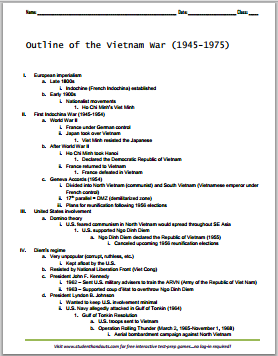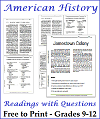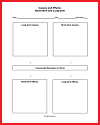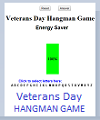| Share the learning joy! |
Vietnam War Outline: Facts and Timeline |
| www.learnquestnest.com > U.S. History > Decades of Change > Outlines & PowerPoints |
|
a.
Late 1800s
i.
Indochine (French Indochina) established
b.
Early 1900s
i.
Nationalist movements
1.
Ho Chi Minh’s Viet Minh
II.
First Indochina War (1945-1954)
a.
World War II
i.
France under German control
ii.
Japan took over Vietnam
1.
Viet Minh resisted the Japanese
b.
After World War II
i.
Ho Chi Minh took Hanoi
1.
Declared the Democratic Republic of Vietnam
ii.
France returned to Vietnam
1.
France defeated in Vietnam
c.
Geneva Accords (1954)
i.
Divided into North Vietnam (communist) and South Vietnam
(Vietnamese emperor under French control)
ii.
17th parallel = DMZ (demilitarized zone)
iii.
Plans for reunification following 1956 elections
III.
United States involvement
a.
Domino theory
i.
U.S. feared communism in North Vietnam would spread throughout
SE Asia
1.
U.S. supported Ngo Dinh Diem
a.
Ngo Dinh Diem declared the Republic of Vietnam (1955)
i.
Canceled upcoming 1956 reunification elections
IV.
Diem’s regime
a.
Very unpopular (corrupt, ruthless, etc.)
i.
Kept afloat by the U.S.
b.
Resisted by National Liberation Front (Viet Cong)
c.
President John F. Kennedy
i.
1962 – Sent U.S. military advisers to train the ARVN (Army of
the Republic of Viet Nam)
ii.
1963 – Supported coup d’état to overthrow Ngo Dinh Diem
d.
President Lyndon B. Johnson
i.
Wanted to keep U.S. involvement minimal
ii.
U.S. Navy allegedly attacked in Gulf of Tonkin (1964)
1.
Gulf of Tonkin Resolution
a.
U.S. troops sent to Vietnam
b.
Operation Rolling Thunder (March 2, 1965-November 1, 1968)
i.
Aerial bombardment campaign against North Vietnam
iii.
“Americanization” of the war
1.
Late 1966 – almost 400,000 U.S. troops in Vietnam
V.
War tactics
a.
United States
i.
Policy of attrition
1.
Plan to defeat Viet Cong through massive casualty rate
2.
Air strikes, napalm, Agent Orange
3.
Result – lots of civilian casualties
a.
Villagers grew more anti-American
b.
U.S. troops demoralized
b.
Viet Cong tactics
i.
Guerrilla warfare
1.
Left U.S. with few easy targets
2.
American troops could not easily distinguish friend from foe
VI.
Bad press for the United States
a.
Tet Offensive (1968)
i.
Launched by Viet Cong and North Vietnamese Army
1.
Simultaneous attack on cities and American troops in South
Vietnam
b.
My Lai Massacre (1968)
i.
Hundreds of unarmed civilian villagers murdered by American
soldiers
c.
Television coverage
i.
War footage viewed on nightly news broadcasts
VII.
Antiwar movement
a.
Many members – hippies, protesting students, and mainstream
people
b.
Draft protests
i.
Many dodged the draft and burned their draft cards
ii.
Violence erupted
1.
Democratic National Convention (1968)
2.
Kent State University shootings (1970)
c.
Richard Nixon
i.
Elected U.S. president in 1968
ii.
Claimed war support from a “silent majority”
d.
Vietnamization of the war
i.
Movement to turn war management over to South Vietnam
ii.
But meanwhile Nixon illegally bombed Viet Cong bases in Cambodia
and Laos (neutral countries)
e.
Pentagon Papers
i.
“United States-Vietnam Relations, 1945-1967: A Study Prepared by
the Department of Defense”
ii.
Published by New York
Times in 1971
iii.
Revealed less than noble reasons for U.S. involvement
iv.
Revealed that successive U.S. presidents had lied to and misled
the public
VIII.
End of the war
a.
Diplomatic and military maneuverings brought a ceasefire in
January, 1973
i.
Last of the U.S. military left Vietnam in March, 1973
b.
U.S. kept funding the army of South Vietnam
i.
But Nixon distracted by Watergate scandal
c.
Saigon fell to North Vietnam (April 30, 1975)
d.
Country reunited as Socialist Republic of Vietnam |
Click
here for a printable version of this
outline (PDF file) that teachers can print as a handout to give to
students. Teachers might also choose to display this .pdf
through a projector and have students copy the outline as notes.
This file prints as two pages (or as one double-sided sheet). |
 |


 I.
I.








